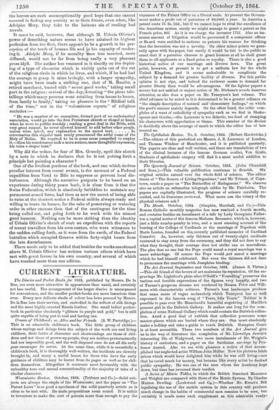Westminster Review. October, 1864. (Triibner and Co.)—Solid sub- jects are
always the staple of the Westminster, and the paper on "The Patent Laws" is as good a specimen of the solid quarterly article as is often to be met with. Its main propositions seem sound. It is unfair to inventors to make the cost of patents more than enough to pay the expenses of the Patent Office on a liberal scale. At present the Govern- ment makes a profit out of patentees of 40,0001. a year. In America a patent costs 71. 6s. 10d., but if we cannot hope to rival the excellence of the American system surely we might manage to grant a patent at the French price, 801. As it is we charge the inventor 175L Also an im- mense amount of litigation would be prevented if a competent officer or Board were entitled to endorse on patents his reasons for thinking that the invention was not a novelty. On other minor points we gene- rally agree with the paper, but surely it would be fair to the public to enact that if a patentee chooses to grant licences at all he shall grant them to all applicants at a fixed price or royalty. There is also a good historical notice of our marriage and divorce laws. The great point, however, at present is to get a uniform law for the whole United Kingdom, and it seems undesirable to complicate the subject by a demand for greater facility of divorce. For this public opinion is not ripe, and indeed the reviewer seems to demand far greater liberty than would be advantageous. Of the lighter papers a severe but not unkind or unjust notice of Mr. Dickens's novels deserves attention, as also does a paper on Mr. Tennyson's last volume. The chief advance to be noted in it is determined to be a greater reliance on "the simple description of natural and* elementary feelings," on which the poet's success mainly depends. On the other hand, the critic com- plains of a want of catholicity of sympathy such as we find in Shake- speare and Goethe,—the Laureate is too didactic, too fond of stamping his characters with approbation or blame. This number of the Review is decidedly above the average of merit to which the editor has of late treated us.


































 Previous page
Previous page